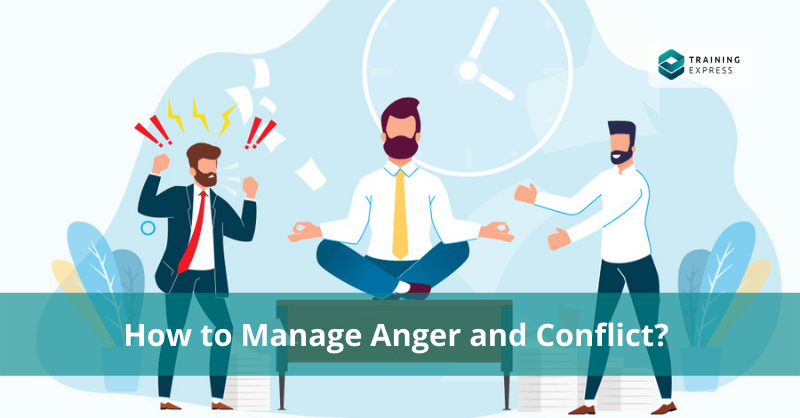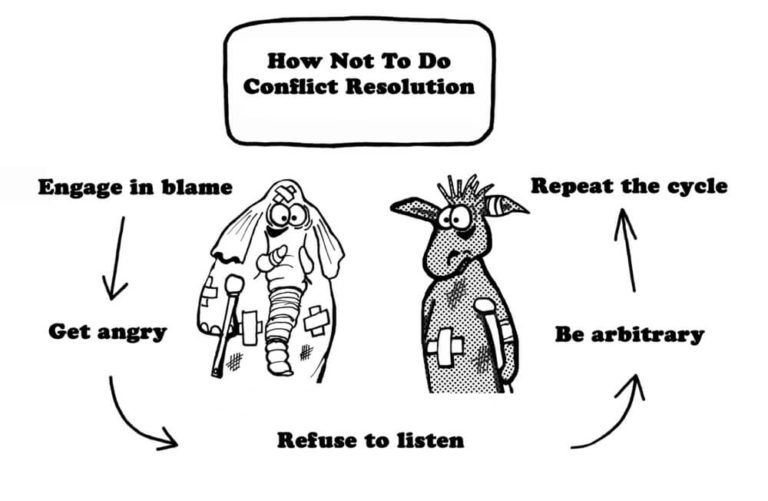
Do you find yourself getting angry often? Or do you avoid conflict like the plague? If your answer to both or any of these two is yes, then this blog is for you. However, before knowing how to manage anger and conflict, we need to figure out where this anger is coming from.
Table of Contents
Understand Where The Anger Comes From
Before trying to fix a problem, we need to get to the root cause of it. That’s why we need to understand why we get angry in a certain situation, and then move on to how to manage anger and conflict. Following are some of the underlying issues that can cause anger:
- Unmet needs
- Threat to safety
- Grief and loss
- When boundaries get violated
- Disappointments
- Guilt and shame
- Bitterness or resentment
- Vitamin deficiencies
- Substance abuse
With the right tools and help, we can rewire our brains to respond positively instead of negatively. This starts with correcting our thoughts and carefully choosing the words that we use when interacting with people. This significantly affects our actions. Therefore, it is important that our thoughts, words, and actions line up with our core principles and values.
How do we learn to rewire our brains?
Through practice and repetition, we can reinforce good habits and remove bad habits of rage. Through focussed attention, we can release a learning/memory transmitter called Acetylcholine. You will then get pleasure from learning, which releases a reward neurotransmitter called Dopamine. Looking after the body well means the right brain chemicals will be active, which in turn will reduce your anger.
Moreover, Anger Management and Conflict Resolution course by Training Express is designed to help you address such challenges. It will teach you how to combat your rage and manage conflicts. In addition, you will learn how to rewire your brain and focus on love and relationships to manage your anger.
How to Manage Anger: 20 Tips to Control Your Anger
Anger is no one’s best friend! And unfortunately, the more we give in to our anger, the less control we have over ourselves. That’s why we all should learn how to manage our anger and try to live a better life with healthier relationships. Here are 20 tips on how to manage anger.
1. Get Some Water
Maybe it sounds not-so-effective, but it really works. Whenever you’re feeling angry or overwhelmed, get a glass of water, splash water on your face, take a shower or run a bath. The reason it helps is that water has natural calming properties. This technique also helps with stress and anxiety management.

2. Cool Off
Take a time out and sit away from others to give yourself time to cool off. Give yourself time to process what happened that made you feel angry.
3. Just Breathe
Your breath becomes shallow and fast when you are angry, so you can counteract this by taking deep breaths in through the nose and out through the mouth. Do this a couple of times to get the desired results.

4. Count
Count down from 100 to give yourself time to cool down, allow your heart rate to slow, and take your mind off of what has made you angry.
5. Stretch Your Muscles
Do some yoga or just roll your shoulders and neck to connect with your body and let go of any tension you are holding.

6. Write
Write a letter to the source of your anger and process your feelings without taking them out on anyone. Writing can be very cathartic, so take your time and really get into your emotions.
7. Talk to a Trusted Confidant
Have a good rant to someone you can trust about what is making you angry. Hopefully, they will offer a new perspective, but at the very least, you will get things off your chest.
8. Be Empathetic
If you feel like someone has wronged you, try to imagine the situation from their point of view, maybe it was just a mistake, or there are reasons for their behaviour that could lead you to feel more understanding of what happened.
9. Be Creative
Find a creative outlet for your emotions, whether it is painting, writing poetry or gardening. Doing something proactive with your excess energy can help to calm you down.
10. Practice Forgiveness
Imagine forgiving the person or people that have made you feel angry. Even if you cannot yet get past it, just pretend you have forgiven them and watch your anger subside.
11. Be Grateful
Instead of focussing on what is going wrong, think about all the things that are going in your favour. Be grateful for your health, the roof over your head and the food on your table, as it could always be much worse.
12. Try to Laugh
Try to find the funny side, do not take yourself too seriously. Look for ways to laugh, whether it’s watching some stand-up comedy, a comedy film, or looking at funny memes. Laughter is a good way to dissipate anger.

13. Listen to Music
Music can be a great way to change your emotions. Just make sure you listen to something uplifting and joyful and not angry music! Preferably something you can dance to, and you will soon shake off those angry feelings.
14. Practice Visualisation
Relax and picture yourself on a warm beach or on top of a massive mountain with stunning views. Focus on the details, what else is around you, how it feels to be there etc. You will soon calm down, and your anger will ease.
15. Exercise
Go for a walk or a run to let go of any excess adrenaline and energy. Exercise releases endorphins, which are the feel-good chemical that will release you from your anger.
16. Relax
Progressive muscle relaxation requires you to tense up and then slowly relax different areas of your body, one at a time. As you tense and release, take slow, deliberate breaths and picture a yellow light warming up your body as you focus on different parts.

17. Find a Quick Fix
Put whatever is making you angry out of sight and out of mind. For example, if something is broken, throw it away (unless you can fix it). If a room is messy, close the door.
18. Stop
Picture a stop sign when you are getting angry. No really, this works as it is a symbolic reminder to halt what you are doing and rethink your strategy.
19. Bite Your Lip
Keep your mouth shut to avoid saying things you will regret later. Politely excuse yourself, so you can go and calm down.
20. Express Yourself
It is OK to talk about how you are feeling, including that something has made you feel angry. So long as you control your emotions while doing so, as angry outbursts help no one.
How to Manage Conflict?
Conflict can arise in any healthy relationship; people make mistakes, so it is only natural that conflict will happen as a result. It is how you handle the conflict that matters. Conflicts do not have to be a bad thing, but rather are an opportunity to grow and learn together.
However, you can handle conflict very badly, which will likely doom your relationship to further conflicts or end it altogether. This can happen because our brain goes into fight or flight when presented with conflict. That’s when our body prepares us for a physical fight (as this is how cave dwellers likely resolved their conflicts) or to run away (this option is preferable when the fighting would not work).

Yeah, that’s bad conflict resolution. And you should not be doing any of these shown in this picture.
When in fight or flight, it is hard to think clearly. Have you ever been fighting with a partner and decided to walk away or wished you could punch them? Perhaps you have felt confused and overwhelmed with emotions during an argument. These are pretty normal reactions to have during a conflict, so do not worry. You are not alone. Here are some tips and tricks to handle conflict better in the future.
1. Avoid Reacting
No matter what happens, if you respond in any way, things will only escalate further. It is important to remain calm and walk away if necessary, but do not react.
2. Let Go of Your Emotions
It is often the case that conflicts will be worsened by negative things that happen to you on the same day. For example, how annoying is it to sleep in and be late? Your whole day feels out of whack, doesn’t it?
You are far more likely to fall out with someone when you are grumpy and running late. So, what can you do to let go of these negative emotions? Breathe and think of the big picture. You will not remember sleeping in a week from now, let alone a year from now. So you will be late, these things happen, it is not the end of the world. Avoid catastrophising and learn to let go with some of the managing anger tips above.
3. Notice any Reflections
Often during an argument, a couple fighting will mimic each other. If one starts shouting, so will the other person. If one calms down, it is likely the other will also pull back. Notice these patterns and try to steer the argument to cooling down by speaking more slowly and gently. As said previously, try not to react, as this will likely escalate the argument.
4. Take Responsibility
Instead of finger-pointing, acknowledge the part you have played in the conflict. Empathise with the other person and state your understanding of their position. Use “I” statements instead of “you” statements, like “I understand you feel like” or “I can empathise” or “I can see where you’re coming from” or “I know I can be like that”.
5. Compromise
Compromising does not make you weak. It shows you are willing to put your stubborn ego aside and work on a common resolution. In a compromise, everyone walks away with something to show for their efforts. Many people have respect for those who are willing to compromise. In most cases, this is seen as a sign of maturity and a willingness to be a team player.
Conclusion
Hopefully, now you have a better understanding of how to manage anger and conflict? Remember, if you want to truly master your own anger and learn conflict management techniques from the professionals, take our course on Anger Management and Conflict Resolution. It is very affordable and comes with a CPD accredited certificate. You can finish the course in just over 4 hours and be ready to face the world with new skills and knowledge.
Read more on our blog
- Lots of Likes on Instagram: How You Can Quickly Increase Popularity
- Why You Should Use Photo Background Removers For Mobile Devices
- Maximizing ROI: 11 Strategies For Efficient Advertising Spend
- How to Keep Your Data Safe While Applying for Jobs: 6 Tips
- Take Mac Classes to Transform Your Design Profession
- Exploring the landscape of e-commerce hosting
- Personal Branding For Executives: 7 Tips For Maximum Impact
- Transformative Technologies in Senior Living Homes: A Glimpse into 2024
- Continuous Learning: Navigating the Ever-Evolving Landscape of Software Development
- Challenges and Solutions in Implementing Auto Replenishment for Small Businesses
- Available Courses
- Career Bundles72
- Animal care5
- Law8
- Quality Licence Scheme Endorsed111
- Teaching13
- Teaching & Academics Primary27
- Accounting & Finance Primary30
- Training3
- Design9
- IT & Software44
- Healthcare126
- Marketing31
- Health and Safety402
- Construction48
- Electronics25
- Hospitality22
- Health and Social Care219
- Child Psychology37
- Management375
- Business Skills268
- First Aid70
- Employability264
- Safeguarding75
- Food Hygiene103
- Personal Development1277
 Food Hygiene
Food Hygiene Health & Safety
Health & Safety Safeguarding
Safeguarding First Aid
First Aid Business Skills
Business Skills Personal Development
Personal Development







